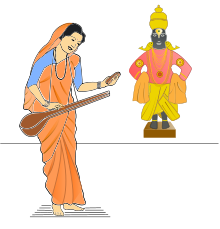Kanhopatra
| Sant Kanhopatra | |
|---|---|

Kanhopatra sings to Vithoba
|
|
| Religion | Hinduism |
| Philosophy | Varkari |
| Personal | |
| Born | 15th century, exact date unknown Mangalvedhe, Maharashtra, India |
| Died | 15th century, exact date unknown Pandharpur, Maharashtra |
| Literary works | Ovi and Abhanga devotional poetry |
| Honors | Sant (संत) in Marathi, meaning "Saint" |
Kanhopatra (or Kanhupatra) was a 15th-century Marathi saint-poet, venerated by the Varkari sect of Hinduism.
Little is known about Kanhopatra. According to most traditional accounts, Kanhopatra was a courtesan and dancing-girl. These accounts typically concentrate on her death when she chose to surrender to the Hindu god Vithoba—the patron god of the Varkaris—rather than becoming a concubine of the Badshah (king) of Bidar. She died in the central shrine of Vithoba in Pandharpur. She is the only person whose samadhi (mausoleum) is within the precincts of the temple.
Kanhopatra wrote Marathi ovi and abhanga poetry telling of her devotion to Vithoba and her struggle to balance her piety with her profession. In her poetry, she implores Vithoba to be her saviour and release her from the clutches of her profession. About thirty of her abhangas have survived, and continue to be sung today. She is the only female Varkari saint to have attained sainthood based solely on her devotion, without the support of any guru, male Varkari saint, or parampara (tradition or lineage).
Kanhopatra's history is known through stories passed down over centuries, making it hard to separate fact and fiction. Most accounts agree about her birth to Shama the courtesan and her death in the Vithoba temple when the Badshah of Bidar sought her. However, the characters of Sadashiva Malagujar (her alleged father) and Hausa the maid do not appear in all accounts.
Kanhopatra was a daughter of a rich prostitute and courtesan named Shama or Shyama, who lived in the town of Mangalvedhe, near Pandharpur, the site of Vithoba's chief temple. Apart from Kanhopatra, Mangalwedhe is also the birthplace of the Varkari saints Chokhamela and Damaji. Shama was uncertain about the identity of Kanhopatra's father, but suspected that it was the town's head-man Sadashiva Malagujar. Kanhopatra spent her childhood in the palatial house of her mother, served by several maids, but because of her mother's profession, Kanhopatra's social status was demeaningly low.
...
Wikipedia
